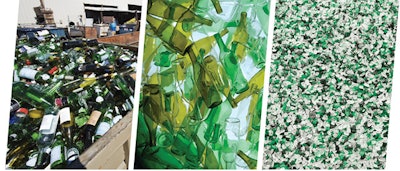
A sand filter is filled with sand, right?
That used to be true, but more pool professionals across the country are filling sand filters with a granular mix of crushed, recycled glass — despite its higher cost. Reasons for this media migration range from performance to convenience to the desire to help the planet (or at least make customers feel like they're helping the planet).
AQUA spoke with three pool companies across the country — one from the West, one from the East and one from the land between — about the role recycled glass plays in their operations. One is just trying the product for the first time, another has it well established in the media mix and as for the third — that's all they sell.
GREEN TO DARK GREEN
Sand is a humdrum, ordinary commodity, and it's been in use for so long, it's a little bit surprising its role was ever challenged in its namesake filter. Even more surprising is that such a natural, green product could ever be replaced by something even more green and eco-friendly.
But of course, everything comes down to performance. And the companies that have switched to glass like the way it does its job.
RELATED: Understanding Different Types of Filter Media
"I went with recycled glass because it filters a little bit better than sand and it lasts longer," says Matt Rozeski of Penguin Systems Unlimited, a pool construction and service company in Waukesha, Wis. "It lasts longer, so we don't have to replace it as often. I don't know if the glass is harder than traditional sand, but it doesn't round out and it can continue to grab dirt for longer. Right now we've got glass media that's been out there for six years and it's still working correctly."
That durability is an endearing quality because, as anyone who's performed the task can attest, the job of changing out sand is a big one. The hardest part is reaching in and hauling out 300 to 400 pounds of loose, reeking sand.
"You're just taking out trash bag after trash bag of old, nasty sand, and it smells gosh-awful," Rozeski says. "And then you've got to dispose of it. We charge to dispose of it, but some customers will actually put one bag of it in the garbage every week and slowly but surely over time dispose of it themselves. And of course that just goes into the landfill.
"Once you have that done, putting in the new media is easier; it comes in nice, clean bags and you just pour it in. An experienced guy that's really moving can do the whole job in about an hour to an hour and a half."
By promising to reduce the frequency of this arduous, time-consuming job, glass has won adherents among homeowners and service techs alike. Beyond its greater stamina, glass proponents claim other performance improvements include better filtering capability.
RELATED: Sand Filters — Tips for Top Performance
Rozeski believes glass claims finer particulates from circulating water, and John Schaedler, vice president of operations/facilities at Aqua Quip in Renton, Wash., says it maintains a more uniform media bed.
"With the glass, we don't find as much channeling and clumping that you normally get with sand," Schaedler says. "It's just more difficult to compact the glass to the point where it's bound together and you get that clumping.
"Also, glass being glass, it's less permeable, so suntan lotions, things of that nature don't get ingrained into it to the point where it's difficult to wash it out."
'IT'S THE ONLY KIND WE SELL'
But for Schaedler and Aqua Quip, performance is not the main selling point for glass — it's the compelling green credentials. The fact that glass filter media is a recycled product taking bottles out of landfill, clinches the deal for consumers in the Puget Sound region.
"The Northwest is known for recycling. Seattle, King County and the state of Washington in general recycles everything," Schaedler says. "And using recycled glass as a filter medium was a real story to tell for us when it first became an option from our company.
"We latched right onto that. And now, when we are selling filter media, it's not even much of a story to tell anymore. We're expected to sell something green, and this is it. So we don't offer them options. We just tell them, 'This is what we sell.'"
"And they say, 'OK, I'll take a bag.'
"We don't even offer sand anymore, which had become the less expensive, more traditional option. But eventually there was no demand for it, and it just became excess inventory that people weren't looking for."
Schaedler notes that the effects of the green movement in the Pacific Northwest go well beyond filter media. Filter system choice for example, is being driven in part by environmental concerns.
"While we still have quite a few sand filters up here," he says, "over the years, due to water conservation efforts, we have seen growth in cartridge filtration — you don't backwash cartridge filters and therefore you don't waste as much water cleaning them."
As profound as the green imperative is for Schaedler and Aqua Quip in Seattle, it's an afterthought for Rozeski in his Midwest market. His customers are just looking for clear water, a long media life cycle and ease of maintenance.
RELATED: Sell Them The Right Filter
"I don't bring up the green side of it," Rozeski says. "I don't pitch the conservation aspect, I just say that we use recycled glass media which works better and lasts longer. Right now the glass manufacturers are stating that it lasts 10 years, and I tell the customers that.
"It's about three times as expensive as regular sand, but you use a little less of it in the filter. Most other aspects work about the same."
Like many service companies in the pool industry, Penguin has seen filtration products come and go, but Rozeski believes glass is here to stay. "We've tried some of the other sand alternatives with unfavorable results — not a fan of those. They seemed to cause more issues than they solved, but with the glass media, it does what it's supposed to, and does it a little bit better than sand."












































